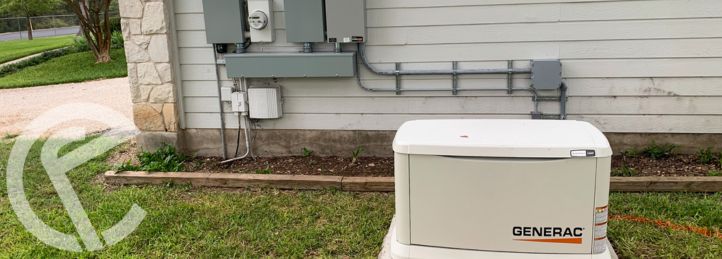Generator Services in San Antonio, TX

Power outages can happen anytime, especially during storms, grid failures, or high-demand periods. With a professionally installed generator from Evenflow Home & Commercial Services, your home or business stays up and running, no matter the conditions. We provide turnkey generator solutions that give you peace of mind and power when you need it most.
- We Are Locally Owned and Operated: Based right here in San Antonio, we understand the local climate, infrastructure, and common power challenges. Our team brings regional insight and personal accountability to every generator installation or repair.
- 100% Satisfaction Guarantee: Your satisfaction is our top priority. We back every generator project with our full commitment to quality, safety, and functionality. If something isn’t right, we’ll make it right, quickly and professionally.
- Focused on Superior Customer Support: From initial consultation through installation and beyond, we keep communication clear and service fast. We help you choose the right generator, handle all logistics, and ensure you're never left in the dark.
Whether you need backup for your family home or commercial property, Evenflow Home & Commercial Services has the experience and integrity to handle the job.
Where your service flows smoothly from start to finish: we guarantee it. Contact us to schedule an appointment with San Antonio’s trusted generator experts.

Why Install a Generator With Evenflow Home & Commercial Services?
Reliable backup power can be a lifesaver, especially in extreme heat, cold, or emergencies. With over two decades of combined electrical and HVAC experience, we deliver trusted generator solutions for any property size.
Community-Trusted Professionals
- Voted Top Service Company on Home Advisor: Our consistent high ratings and positive reviews reflect our punctuality, technical excellence, and courteous service across every generator installation.
- Rated "A" by the Better Business Bureau: We maintain top BBB status through ethical practices, fair pricing, and unwavering customer satisfaction.
- Faith-Based Values in Action: Our team operates with honesty, kindness, and transparency, ensuring that every interaction is rooted in our core values and built on trust.
Complete Generator Solutions for Home and Business
We provide start-to-finish services for standby and portable generators:
- Generator Sizing Consultation: We conduct a comprehensive energy audit to assess critical systems such as HVAC, lighting, refrigerators, medical equipment, and computing devices to match you with the ideal generator model.
- Top Brand Equipment Installation: We supply and install premium generators from leading brands like Generac and Kohler, chosen for their reliable performance, extended warranties, and industry-leading support networks.
- Permitting and Code Compliance: Our licensed electricians and HVAC professionals obtain all necessary permits, complete city inspections, and ensure installations meet San Antonio’s strict building and electrical codes.
- Automatic Transfer Switch Setup: We install ATS units that automatically detect outages and switch your power source without manual input, keeping your home or business uninterrupted.
- Fuel Source Integration: Whether your system runs on natural gas or propane, we secure all connections using code-compliant hardware and conduct pressure and leak testing for maximum safety.
- System Testing and Walkthrough: Upon completion, we simulate power loss conditions, run a full-load test, and provide a user-friendly walkthrough on operation, maintenance scheduling, and basic troubleshooting.
Ongoing Generator Maintenance
Even the best systems require regular upkeep. We provide ongoing generator maintenance and emergency service, including:
- Battery testing and replacement: We test starting batteries under load and replace aging units to ensure your generator powers up instantly during outages.
- Oil and filter changes: Routine oil changes and new air/fuel filters are completed to manufacturer specifications, ensuring smooth, efficient operation.
- Load bank testing: We simulate real-world electrical loads to verify your generator performs reliably under pressure, especially before storm season.
- Controller software updates: Firmware updates are installed to ensure your digital controller has the latest diagnostic features and compatibility with smart monitoring tools.
- System diagnostics and seasonal checks: Our technicians perform seasonal inspections of wiring, fuel lines, coolant levels, and airflow to detect wear and prevent failures before they happen.
Be ready for the next storm or outage. Let Evenflow Home & Commercial Services provide the backup power your home or business deserves.
Always Be Prepared With Backup Power
Don’t wait until the lights go out. Protect your home, business, and loved ones from power disruptions with a standby generator solution that works when it matters most.
Request your free estimate from Evenflow Home & Commercial Services and secure your comfort today.
Common Generator Problems and Backup System Essentials
Even the best standby generators can experience wear, damage, or system failure, especially in San Antonio’s demanding climate. At Evenflow Home & Commercial Services, we provide expert diagnostics, timely repairs, and in-depth system checks to ensure your backup power works flawlessly when you need it.
Generator Issues We Commonly Repair
- Failure to Start During Outage: A generator that won’t kick on can be due to a dead battery, fuel delivery issue, or controller malfunction.
- Frequent Alarms or Error Codes: Alerts from your system may indicate voltage fluctuations, blocked air intakes, oil pressure problems, or controller software bugs.
- Low or Fluctuating Voltage Output: Inconsistent output can damage electronics and typically results from worn brushes, voltage regulator failure, or loose wiring.
- Overheating: Dirty air filters, restricted ventilation, or coolant problems can cause overheating and automatic shutdown.
- Delayed Transfer Switch Operation: If your generator doesn’t switch over right away, the transfer switch could be misconfigured or aging.
- Leaking Fluids (Oil, Coolant, Fuel): Leaks indicate broken seals, loose fittings, or damaged hoses, all of which can compromise operation.
- Unusual Noises or Vibrations: Loud knocking, buzzing, or shaking may suggest mechanical wear or unbalanced load distribution.
Our expert technicians are trained to service all major generator brands, ensuring every component, from the fuel line to the digital controller, operates safely and efficiently.
Noticed a change in your generator’s behavior? Call Evenflow Home & Commercial Services for expert troubleshooting and quick repairs.
What Makes a Standby Generator System Work
A complete backup power system includes more than just a generator. These key components must be installed, configured, and maintained properly:
- Standby Generator Unit: The main power source, designed to automatically engage when utility service is interrupted. Powered by propane, natural gas, or diesel.
- Automatic Transfer Switch (ATS): Detects the loss of power from the grid and switches your home to generator power within seconds. Also returns to grid power when it is restored.
- Fuel Delivery System: Supplies consistent fuel via direct natural gas lines or integrated propane tanks. Requires leak-free connections and proper pressure regulation.
- Battery and Start System: Keeps the generator ready to activate immediately. Needs regular load testing and maintenance.
- Cooling and Exhaust Systems: Maintain safe operating temperatures and direct engine emissions away from the home.
- Load Management Controls: Distribute generator output to priority systems like HVAC, refrigeration, or medical devices, especially useful for limited-capacity models.
- Remote Monitoring and Alerts: Modern systems feature Wi-Fi-enabled apps or monitoring devices that allow users to check fuel levels, maintenance schedules, and receive fault alerts remotely.
Each element plays a vital role in seamless backup protection. At Evenflow Home & Commercial Services, we inspect and optimize every part of your system so you’re never caught off guard.
Don’t guess when it comes to power security. Let our team ensure your generator system is always ready to perform.

Full-Service Generator Solutions in San Antonio
When it comes to backup power, reliability is non-negotiable. At Evenflow Home & Commercial Services, we offer comprehensive generator services, from new installations and upgrades to repairs and preventive maintenance, so you’re never left powerless when it matters most.
Generator Installation
When to Consider
You should consider installing a generator if you experience frequent power outages, rely on medical equipment, work from home, or want to protect perishable food and electronics. Generators are also ideal for hurricane preparedness and remote properties.
Why It’s Important
A professionally installed standby generator ensures your home stays comfortable, safe, and functional during utility failures. It protects critical systems such as HVAC, refrigeration, and security, and provides priceless peace of mind during storms or emergencies.
What’s Included
- Site assessment and sizing: Our technicians evaluate your home’s total power consumption, prioritize essential circuits, and recommend the most efficient generator model that aligns with your specific needs and future expansion.
- Permits and compliance: We obtain all necessary local permits, ensure compliance with NEC and San Antonio codes, and coordinate inspection timelines to streamline approval and avoid delays.
- Generator and ATS installation: We mount your generator on a secure, weather-resistant concrete or composite pad and install an automatic transfer switch that seamlessly shifts your home from utility to generator power.
- Fuel connection and safety testing: Our certified professionals connect your generator to natural gas or propane systems using pressure-tested fittings, perform leak checks, and validate consistent fuel delivery under load.
- Startup, training, and inspection: After final setup, we run a full diagnostic startup sequence, perform a live load simulation, and teach you how to safely operate, monitor, and maintain the system using physical controls and mobile apps.
Avoid the stress of a blackout, install your standby generator with Evenflow Home & Commercial Services today.
Generator Repair
When to Consider
If your generator fails to start, emits strange noises, or displays alerts on its control panel, it likely needs repair. Also, consider service if it’s been sitting idle for an extended period without testing.
Why It’s Important
A malfunctioning generator can fail when you need it most. Prompt repairs reduce downtime, prevent further damage, and keep your backup power reliable year-round.
What’s Included
- Complete diagnostics: We perform comprehensive system evaluations, including control panel reviews, fuel pressure checks, wiring inspections, and battery voltage readings, to identify root causes of failure.
- Component repairs and replacements: Our team replaces faulty starters, fuel regulators, solenoids, sensors, and ignition components using OEM-approved parts to ensure compatibility and longevity.
- Testing and recalibration: After repairs, we run your generator through multiple test scenarios, calibrate the voltage output and frequency, and optimize transfer switch settings for responsive performance.
- Code correction: If your generator was improperly installed by another provider, we will realign it with local codes and standards, updating wiring, grounding, and panel configuration as needed.
Restore full functionality and performance with a quick repair from Evenflow Home & Commercial Services.
Generator Maintenance
When to Consider
Maintenance should be scheduled annually or biannually, especially before storm season. Also consider maintenance after extended run times, post-installation, or when your system displays service codes.
Why It’s Important
Preventive maintenance extends your generator’s life, enhances efficiency, and ensures it activates when needed. It helps detect problems early, avoiding costly breakdowns.
What’s Included
- Battery checks and fluid top-offs: We test battery charge and load capacity, inspect for corrosion, and refill engine oil, coolant, and fuel additives to manufacturer specifications.
- Filter and spark plug replacement: Old filters and worn spark plugs reduce efficiency. We replace them with high-quality replacements to ensure clean combustion and reduce engine wear.
- Load testing and controller inspection: Our team simulates real-world outages using load banks to confirm that the generator can handle your home’s demands while also reviewing software logs and updating firmware.
- General inspection and cleaning: We check and tighten wiring connections, clean air inlets, inspect exhaust systems for blockages, remove debris around the unit, and ensure all safety labels are intact.
Protect your investment and peace of mind with a maintenance plan from Evenflow Home & Commercial Services.
From planning to performance, Evenflow Home & Commercial Services is San Antonio’s trusted partner for complete generator services.
Request your installation quote or maintenance appointment today. Stay safe, stay powered.
